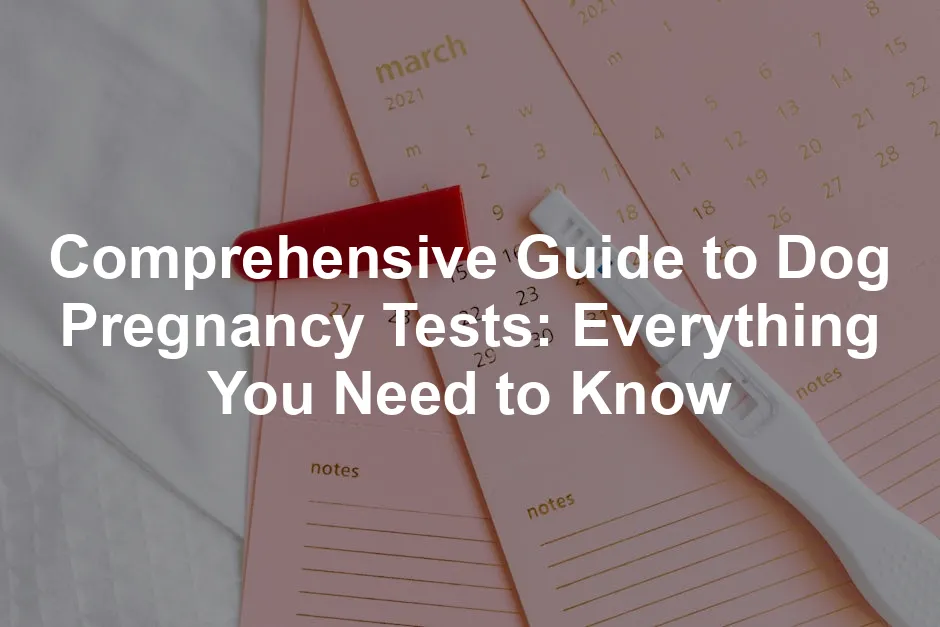Understanding Dog Pregnancy Tests
A dog pregnancy test is a tool that helps confirm if your dog is pregnant. It primarily detects a hormone called relaxin. This hormone is produced by the placenta, which forms after a successful pregnancy.
During pregnancy, hormonal changes are significant. Relaxin levels rise, making it detectable in the blood. This test is different from human pregnancy tests. Human tests check for hCG, a hormone not found in dogs.
With a dog pregnancy test, you can get quick results from the comfort of your home. It’s a practical option for responsible pet owners. Knowing if your dog is pregnant allows you to prepare for the upcoming changes.
Consider exploring various testing options available. From veterinary tests to home kits, there’s a method that fits your needs. Being proactive about your dog’s health is essential for both of you.

Speaking of being proactive, why not invest in a Dog Pregnancy Test Kit? This handy tool allows you to check your furry friend’s pregnancy status without having to leave the house. It’s quick, easy, and could save you a trip to the vet!
Types of Dog Pregnancy Tests
Blood Tests
Blood tests are a reliable method for confirming dog pregnancy. They work by detecting the presence of a hormone called relaxin. This hormone is produced by the placenta after the embryo implants, making it a key indicator of pregnancy.
To conduct a blood test, a small sample is drawn from your dog, usually at a veterinary clinic. For accurate results, it’s best to test between 22 to 27 days post-breeding. Testing too early may lead to false negatives, as relaxin levels may not yet be detectable.
The relaxin test is beneficial because it can differentiate between actual pregnancies and pseudopregnancies, ensuring peace of mind for dog owners. If you suspect your dog is pregnant, consult a vet for blood testing. They can guide you through the process and provide valuable insights for your dog’s health.
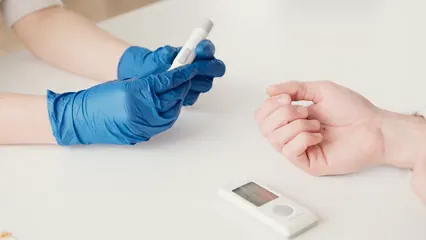
Home Pregnancy Tests
Home pregnancy tests are gaining popularity among dog owners. These kits offer a convenient way to check for pregnancy without a vet visit. Most home tests measure relaxin levels, similar to blood tests, providing results quickly—often within 10 to 15 minutes.
Using a home pregnancy test is straightforward. You collect a small blood sample and follow the kit instructions for processing. While these tests are generally accurate, they may not be as reliable as veterinary tests, especially if used too early.
Home tests allow you to monitor your dog’s pregnancy status in a stress-free environment. If you’re considering a home pregnancy test, explore popular dog pregnancy kits available online. They can be a helpful tool for proactive pet care. And while you’re at it, don’t forget to stock up on a Pet First Aid Kit to be prepared for any unexpected events!

Ultrasound and X-rays
Ultrasound and X-rays are valuable tools for confirming dog pregnancy. Ultrasound is the preferred method, allowing you to see developing embryos as early as 20 days after mating. This technique not only confirms pregnancy but also helps assess the health of the puppies.
To get the best results, schedule an ultrasound between 20 to 30 days post-breeding. This timing ensures that the embryos are large enough to be detected. On the other hand, X-rays can be useful later in pregnancy, usually around 45 days, when the puppies’ bony structures become visible. However, using X-rays too early may lead to misleading results.
Keep in mind that X-rays expose your dog to radiation. Therefore, they should be used cautiously and only when necessary. If you suspect your dog is pregnant, it’s best to consult your veterinarian for an ultrasound. This non-invasive method is safe and effective for pregnancy confirmation. And while you’re ensuring your dog’s health, consider a Dog Crate for a safe and comfortable space for her as she prepares for motherhood.

Understanding Positive and Negative Results
Interpreting dog pregnancy test results can be confusing, especially when it comes to positive and negative outcomes. A positive result indicates that your dog is pregnant, meaning relaxin has been detected. This hormone is released by the placenta, confirming pregnancy.
On the flip side, a negative result doesn’t always mean your dog isn’t pregnant. False negatives can happen, particularly if the test is done too early. If your dog tests negative but you still suspect pregnancy, follow up with another test in about a week.
After receiving your results, consider keeping a record of testing dates and outcomes. This practice helps you stay informed about your dog’s reproductive health. If you get a positive test, plan for veterinary care to ensure proper prenatal support. Always consult your vet if you have concerns about the results or your dog’s health.

Factors That Affect Test Accuracy
When it comes to dog pregnancy tests, several factors can influence the accuracy of results. One of the most critical factors is timing. For best results, it’s important to conduct the test between 22 to 27 days after mating. Testing too early may lead to false negatives, as the relaxin hormone may not yet be detectable in the blood.
Another essential consideration is the size and breed of your dog. Smaller breeds may not produce enough relaxin to yield a positive result, particularly if they are carrying only one or two puppies. This can make it challenging to accurately confirm pregnancy without further testing.
Each dog is unique, and these variations can impact the reliability of the results. If you’re unsure about the outcome of a dog pregnancy test, consulting with a veterinarian is always a wise choice. They can provide professional guidance and suggest additional testing methods if needed. And while you’re thinking about your dog’s health, how about a Dog Health Book to help you understand all aspects of your furry friend’s well-being?
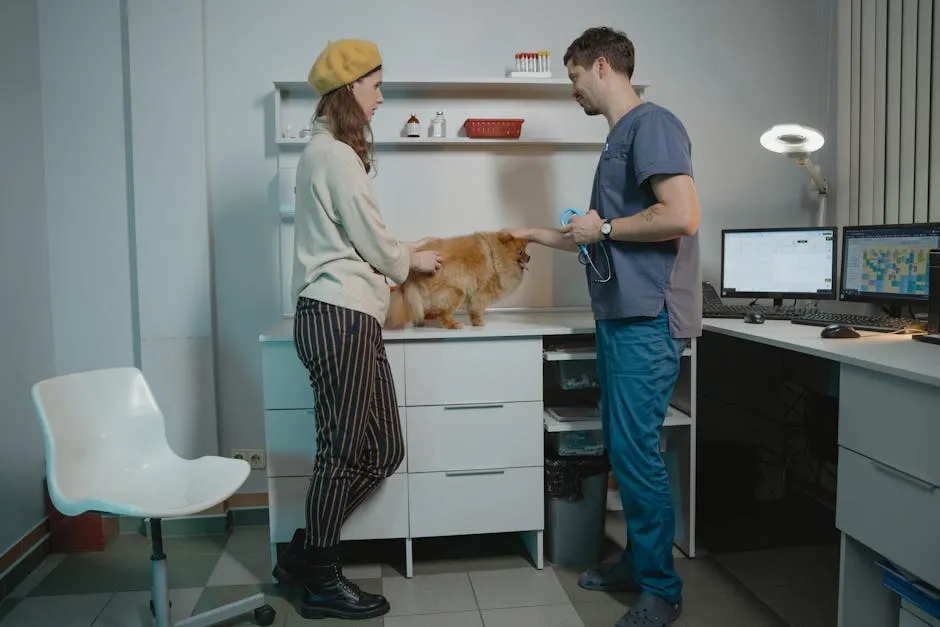
Signs of Pregnancy in Dogs
Early Signs of Canine Pregnancy
Noticing the early signs of pregnancy in your dog can be quite exciting. One of the first indicators is a change in appetite. Your dog may eat less initially, akin to morning sickness. As time goes on, you might see an increase in her appetite as the puppies grow.
Behavioral changes can also be evident. If your usually energetic dog seems more lethargic or seeks solitude, these may be signs of pregnancy. Additionally, you may observe physical changes such as weight gain and more prominent nipples, often referred to as “pinking up.”
Around 30 days post-mating, you might notice these physical changes. Some dogs can also exhibit nesting behavior as they prepare for their puppies. If you suspect your dog is pregnant, it’s important to monitor these changes closely and consult your vet for confirmation.
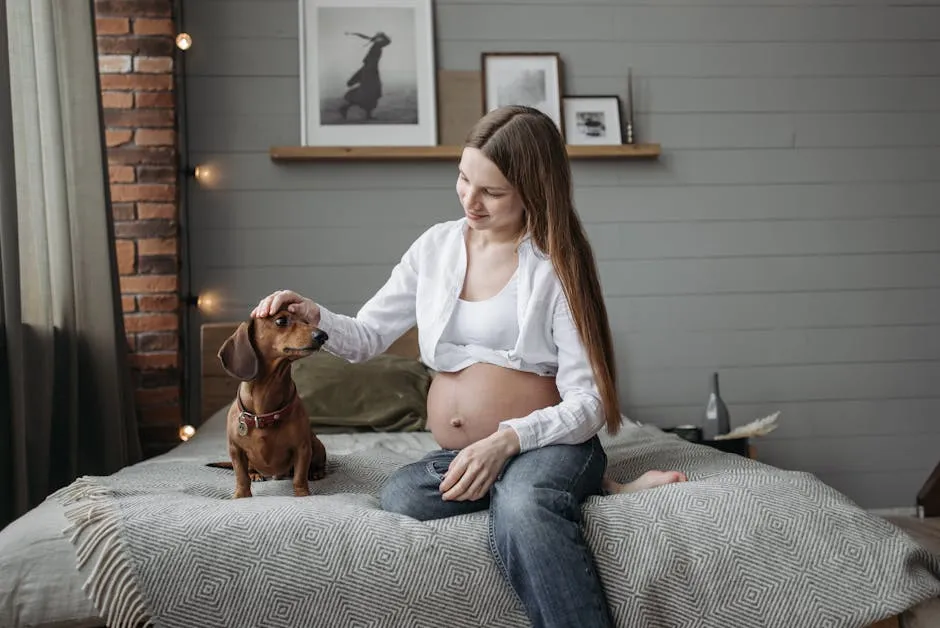
When to Consult a Veterinarian
As a responsible pet owner, early veterinary care is crucial during your dog’s pregnancy. If you suspect your dog is pregnant, scheduling a vet appointment can provide peace of mind and valuable guidance.
Watch for signs of complications during pregnancy. Excessive vomiting, lethargy, or unusual behavior could indicate a problem. These symptoms may suggest conditions like infections or fetal distress. Additionally, if your dog shows signs of distress while giving birth, seek immediate veterinary assistance.
Regular check-ups are essential to monitor your dog’s health and the development of her puppies. Your vet can offer advice on nutrition, exercise, and overall care during this critical time. They can also confirm the pregnancy and provide insights into what to expect. And don’t forget to check out a Dog Training Pads to help with any accidents during this time!
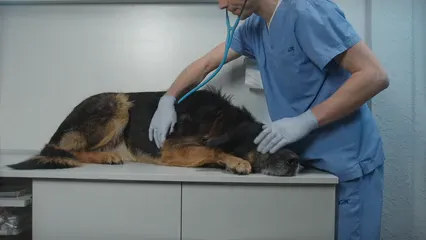
Remember, early intervention can make a significant difference in your dog’s well-being. If you have any concerns about your dog’s pregnancy, don’t hesitate to contact your veterinarian. Schedule a vet appointment for any concerns and ensure the best care for your furry friend.
Conclusion
Confirming a dog’s pregnancy is vital for responsible pet ownership. Regular testing and veterinary consultations help in understanding your dog’s health and preparing for the arrival of puppies. Be proactive in confirming pregnancies and addressing any concerns.
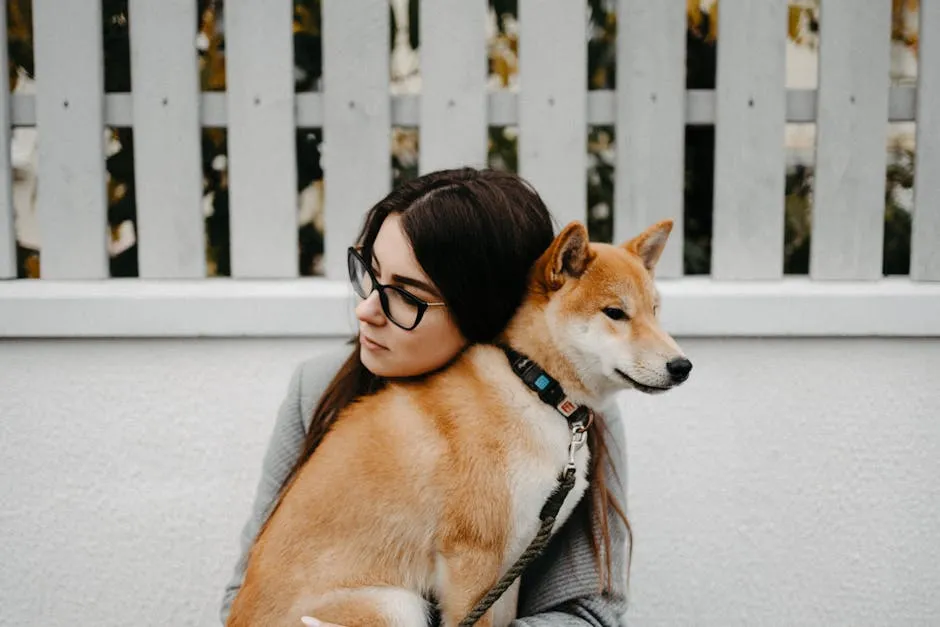
Consider making regular vet check-ups a part of your routine. Monitoring your dog’s health ensures she receives the best possible care during pregnancy. A little preparation goes a long way in ensuring the health of both mother and pups. And while you’re at it, grab a Dog Grooming Kit to keep her looking fabulous throughout her pregnancy!
Please let us know what you think about our content by leaving a comment down below!
Thank you for reading till here 🙂
All images from Pexels

